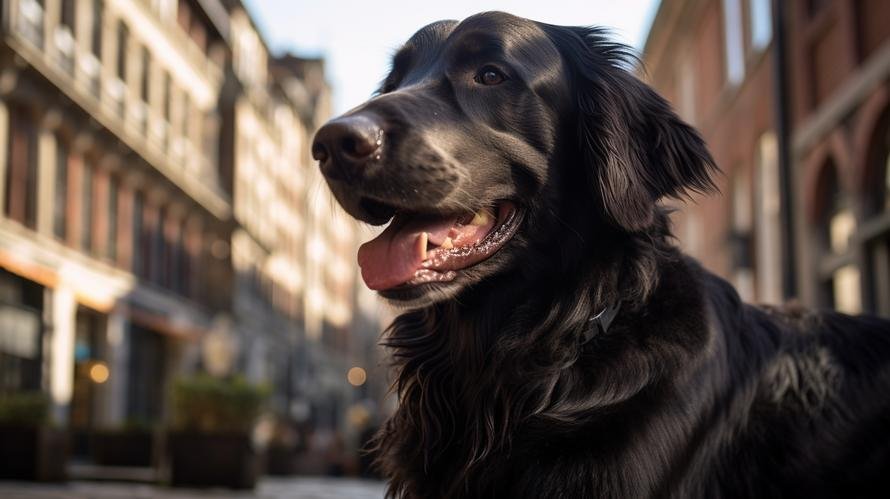Did you know? The Flat-Coated Retriever, charmingly often called the “happy retriever,” is a multifaceted breed. Not only do they make excellent family pets, but they are also among the “working” dogs often found serving in various aid organizations and in search and rescue operations. With all these demands and activities, you might wonder, “What is the best food for my Flat-Coated Retriever?”
Let’s delve into the fascinating world of feeding these joyful creatures and discover why proper nutrition plays a crucial role in maintaining their health and happiness.
One common misconception about Flat-Coated Retrievers is that you can take a ‘one-size-fits-all’ approach to their diet. But in reality, the best food for your furry friend will depend on their specific needs. Factors like age, activity level, and overall health dictate the type and quantity of food they should consume. Let’s break it down.
For those adorable Flat-Coated puppies, their dietary needs revolve around growth and development. High-quality puppy food rich in protein provides the building blocks for developing muscles, whereas a blend of essential minerals supports strong bones and teeth formation. The AAFCO (The Association of American Feed Control Officials) recommends a protein content of at least 22.5% and a fat content of approximately 8.5% for growth.
Adult Flat-Coat Retrievers, being one of the most active breeds, require a diet packed with nutrients and a good balance of protein, carbohydrates, and fats. Protein helps in maintaining lean muscle mass, while fats provide the energy for their daily activities. Carbohydrates often contribute necessary dietary fiber for smooth digestion.
Now, suppose your loyal companion is in its senior years. In that case, a diet that’s lower in calories but high in easily digestible protein is a great way to keep the weight off and prevent conditions like arthritis and diabetes.
“Diet variety is key in ensuring a rounded nutrient profile for Flat-Coated Retrievers,” advises Dr. Emily Wilson, a veterinary nutritionist, “Incorporating different types of meat such as chicken, beef, fish, or lamb provides a diverse spectrum of essential amino acids, while mixing various fruits and vegetables can contribute important vitamins and antioxidants.”
One remarkable aspect of the Flat-Coated Retriever’s dietary need is the inclusion of omega-3 fatty acids. Active breeds like these can often be prone to joint issues, and studies have shown that omega-3 fatty acids can help reduce inflammation and improve joint health. Fish, particularly salmon, is an excellent source of this nutrient.
For those who prefer commercially prepared dog food, remember to read the labels. Choose foods with real meat as the first ingredient and avoid products with artificial colors, flavors, or preservatives. You’d also do well to steer clear of foods with unspecified meat or poultry by-products, as these give no guarantee of quality or nutritional value.
Feeding frequency is another essential consideration. For puppies aged around 8-12 weeks, it’s best to feed them small portions four times daily. As they grow older, you can gradually reduce it to three meals a day, and then eventually to two meals around the age of six months.
Another crucial piece of advice is to avoid overfeeding. Flat-Coated Retrievers have a hearty appetite but are also prone to obesity. They rely on their humans to regulate their food intake. Providing measured meals instead of free feeding can help prevent weight gain and associated health problems.
Remember to always provide plenty of clean, fresh water. Flat-Coated Retrievers are active and playful and need constant hydration, especially after strenuous activity or during hot weather.
A treat here and there is perfectly okay and can be an excellent way to reward good behavior. However, treats and human food shouldn’t make up more than 10% of a dog’s daily caloric intake. Also, give treats that offer nutritional benefits such as dental chews or low-fat dog biscuits.
Food allergies in Flat-Coated Retrievers are, to some degree, breed-specific. Chicken, beef, soy, corn, and wheat are the most common food triggers for irritations. If you suspect food allergies, a consultation with a vet is necessary to diagnose the cause and find an appropriate substitute.
Finally, always consult with your veterinarian before making significant changes to your Flat-Coated Retriever’s diet, especially if you’re considering transitioning to a home-cooked or raw diet. Your vet can provide valuable guidance based on your pet’s health profile and help you avoid missing essential nutrients or causing dietary imbalances.
Feeding your Flat-Coated Retriever can be a science and an art, adjusting to their unique needs as they grow and change. But with love and care, you can ensure that your “happy” retriever stays healthy and active, ready to embrace all the fetch games, swimming sessions, and cuddling moments the day has to offer. After all, isn’t that what owning one of these loving companions is all about?



